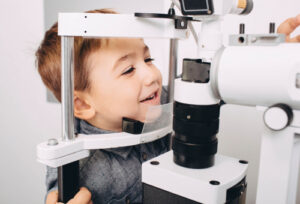Blog post by: Eye Physicians of Long Beach

Has your primary care physician recommended that your child sees a pediatric ophthalmologist? Going to a top ophthalmologist specializing in pediatrics guarantees your child receives the best possible vision care. Pediatric ophthalmologists have the qualifications and experience to correctly diagnose, manage, and treat all children’s eye issues. They are also experts at detecting subtle signs of eye problems that small children are unable to describe.
Since children can’t always say if their eyes are bothering them, a pediatric ophthalmologist can be very helpful. They know how to make children cooperate to get the help they need. If your child is struggling to see, a pediatric ophthalmologist may be the next step. Keep reading to discover what to expect during your visit to a pediatric ophthalmologist and the eye conditions they can help treat.
What to Expect When Seeing a Pediatric Ophthalmologist
Knowing what to expect when your child sees a pediatric ophthalmologist will help you feel at ease and less anxious. You’ll also be more likely to have a positive experience. Here’s what happens when you meet with your child’s pediatric ophthalmologist at Eye Physicians of Long Beach:
Eye History
Your child’s pediatric ophthalmologist will want to know about your family history of eye diseases and your child’s medical history. Make sure you tell the eye doctor about any previous eye problems, allergies, treatments, medications, or surgeries your child may have had. Your child’s pediatric ophthalmologist will also ask if you’ve noticed anything unusual about your child’s eyes like:
- Frequent blinking or eye rubbing
- Sensitivity to light
- Crust or pus in the eyes
- Excessive tears
- Eyes moving forward and backward involuntarily
- Squinting
- Drooping eyelids
- Wandering eyes
- Getting tired quickly after reading or being slower while reading
- Difficulty maintaining eye contact
- Turning or tilting head to use only one eye
- Holding objects too close to the face to look at them
Vision Assessment

Pediatric ophthalmologists test your child’s vision using various techniques depending on how old your child is. They use pictures, matching games, letter recognition, and more. If your child is a new patient at Eye Physicians of Long Beach, their pediatric ophthalmologist will start by dilating their eyes with eye drops. These may cause stinging and blurry vision, which will go away after a few hours.
Dilating your child’s eyes enables the ophthalmologist to examine the back and inside of the eyes and assess the health of your child’s lens and retina. Additionally, the pediatric ophthalmologist will use special instruments to check for farsightedness, nearsightedness, and astigmatism.
Pupil Exam
A pupil exam is essential in ensuring your child’s pupils are the same and respond to light similarly.
Ocular Motility Evaluation
An ocular motility assessment tests your child to see if they have any eye movement disorders or alignment disorders. By shining a light on your child’s eyes, the pediatric ophthalmologist can tell if their eyes are in correct alignment and moving the right way. An ocular motility assessment can diagnose common eye conditions in children like amblyopia and strabismus.
Externally Checking Eyes and Eyelids
Using a penlight, the pediatric ophthalmologist will inspect how healthy the front of your child’s eyes are. This includes looking at the eyelids, iris, and cornea. With the help of this exam, your child’s pediatric ophthalmologist can discover if your child has persistent tearing or discharge in the eyes.
Red Reflex Test
A red reflex exam can detect abnormalities in your child’s eyes. During the test, the eye doctor flashes a light in the eyes. If the ophthalmologist sees red, that’s an indication of healthy eyes. If the pediatric ophthalmologist sees colors like white or black instead of seeing red, it could signal vision problems. For instance, white may mean your infant has pediatric cataracts.
What to Bring
Remember to bring a comprehensive list of all the names and addresses of doctors who may be treating your child. Having this list will make it easier for the pediatric ophthalmologist to forward crucial findings to other physicians. Also, don’t forget to bring your insurance card to ensure your child’s appointment goes as smoothly as possible.
Conditions a Pediatric Ophthalmologist Can Treat
A pediatric ophthalmologist can diagnose serious eye conditions early. Diagnosing and treating pediatric eye conditions is vital to preserving your child’s vision. Here are some common eye problems a pediatric ophthalmologist can help treat. These are only some of the many eye conditions that pediatric ophthalmologists can treat.
Strabismus
Strabismus or crossed eyes affect both eyes. It develops when the eyes lack alignment. When the eyes are not aligned, it can cause them to turn upward or sometimes upward and sideways. Timely detection and treatment of strabismus can resolve the issue, ensuring your child’s eyesight develops as it should.
Amblyopia

Also called lazy eye, amblyopia is a condition that occurs when vision doesn’t develop properly in the brain. As a result, the brain favors the eye that functions correctly. When the brain favors one eye over another, this leads to vision loss in the weaker eye. If left untreated, amblyopia can cause severe vision problems or even legal blindness. The main thing to remember is that prompt diagnosis and treatment of amblyopia will help improve your child’s vision and quality of life.
Myopia
Myopia, also known as nearsightedness, is a refractive error that’s a common vision problem in childhood. When your child has myopia, they’ll find it difficult to see the board in class and other far-away objects. Myopia in children increases the risk of developing sight-threatening diseases later in life, like:
- Cataracts
- Glaucoma
- Myopic macular degeneration

A pediatric ophthalmologist can control or stop myopia progression with prescription glasses and drops. Corrective lenses and medications decrease your child’s chances of developing other conditions that can threaten their vision in the future.
Choose the Best Pediatric Ophthalmologists
The pediatric ophthalmologists at Eye Physicians of Long Beach comprise a team of highly skilled eye doctors. Our experienced pediatric ophthalmologists provide best-in-class eye care in a reassuring, fun, and comfortable environment. Does your child need to see a pediatric ophthalmologist? Schedule an appointment at Eye Physicians of Long Beach in Long Beach, CA, and know that your child’s eyes are in the best hands!
